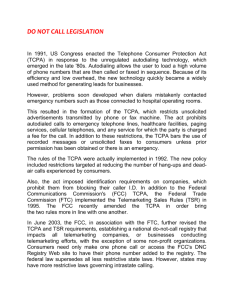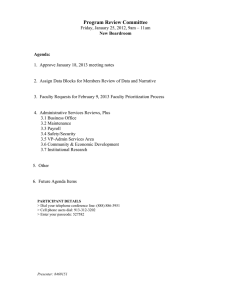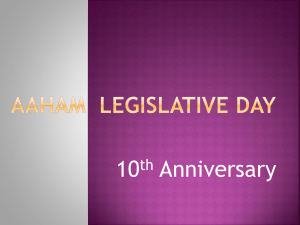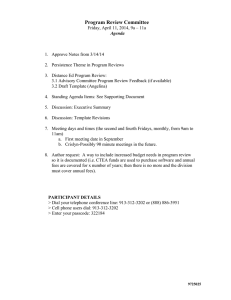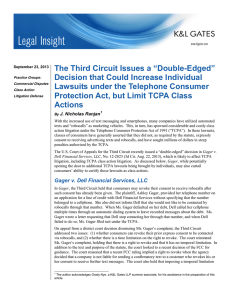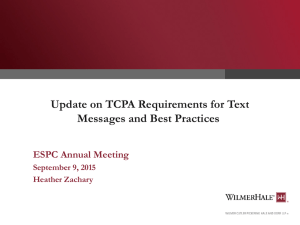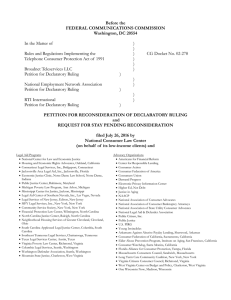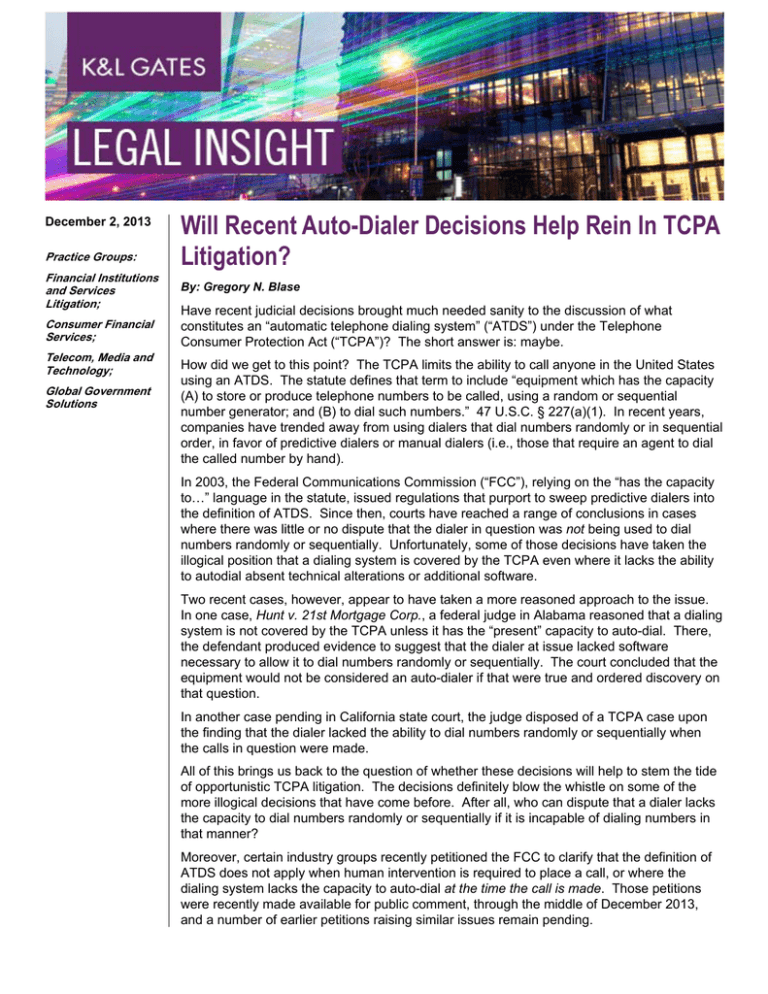
December 2, 2013
Practice Groups:
Financial Institutions
and Services
Litigation;
Consumer Financial
Services;
Telecom, Media and
Technology;
Global Government
Solutions
Will Recent Auto-Dialer Decisions Help Rein In TCPA
Litigation?
By: Gregory N. Blase
Have recent judicial decisions brought much needed sanity to the discussion of what
constitutes an “automatic telephone dialing system” (“ATDS”) under the Telephone
Consumer Protection Act (“TCPA”)? The short answer is: maybe.
How did we get to this point? The TCPA limits the ability to call anyone in the United States
using an ATDS. The statute defines that term to include “equipment which has the capacity
(A) to store or produce telephone numbers to be called, using a random or sequential
number generator; and (B) to dial such numbers.” 47 U.S.C. § 227(a)(1). In recent years,
companies have trended away from using dialers that dial numbers randomly or in sequential
order, in favor of predictive dialers or manual dialers (i.e., those that require an agent to dial
the called number by hand).
In 2003, the Federal Communications Commission (“FCC”), relying on the “has the capacity
to…” language in the statute, issued regulations that purport to sweep predictive dialers into
the definition of ATDS. Since then, courts have reached a range of conclusions in cases
where there was little or no dispute that the dialer in question was not being used to dial
numbers randomly or sequentially. Unfortunately, some of those decisions have taken the
illogical position that a dialing system is covered by the TCPA even where it lacks the ability
to autodial absent technical alterations or additional software.
Two recent cases, however, appear to have taken a more reasoned approach to the issue.
In one case, Hunt v. 21st Mortgage Corp., a federal judge in Alabama reasoned that a dialing
system is not covered by the TCPA unless it has the “present” capacity to auto-dial. There,
the defendant produced evidence to suggest that the dialer at issue lacked software
necessary to allow it to dial numbers randomly or sequentially. The court concluded that the
equipment would not be considered an auto-dialer if that were true and ordered discovery on
that question.
In another case pending in California state court, the judge disposed of a TCPA case upon
the finding that the dialer lacked the ability to dial numbers randomly or sequentially when
the calls in question were made.
All of this brings us back to the question of whether these decisions will help to stem the tide
of opportunistic TCPA litigation. The decisions definitely blow the whistle on some of the
more illogical decisions that have come before. After all, who can dispute that a dialer lacks
the capacity to dial numbers randomly or sequentially if it is incapable of dialing numbers in
that manner?
Moreover, certain industry groups recently petitioned the FCC to clarify that the definition of
ATDS does not apply when human intervention is required to place a call, or where the
dialing system lacks the capacity to auto-dial at the time the call is made. Those petitions
were recently made available for public comment, through the middle of December 2013,
and a number of earlier petitions raising similar issues remain pending.
Will Recent Auto-Dialer Decisions Help Rein In TCPA
Litigation?
Yet, despite the recent court decisions, and notwithstanding any clarification that may be
forthcoming from the FCC, companies that use predictive dialers to contact customers
should consider appropriate steps to mitigate TCPA litigation risk.
K&L Gates is available to assist clients with TCPA compliance and litigation-related
concerns.
Author:
Gregory N. Blase
gregory.blase@klgates.com
+1.617.951.9059
Anchorage Austin Beijing Berlin Boston Brisbane Brussels Charleston Charlotte Chicago Dallas Doha Dubai Fort Worth Frankfurt
Harrisburg Hong Kong Houston London Los Angeles Melbourne Miami Milan Moscow Newark New York Orange County Palo Alto Paris
Perth Pittsburgh Portland Raleigh Research Triangle Park San Diego San Francisco São Paulo Seattle Seoul Shanghai Singapore Spokane
Sydney Taipei Tokyo Warsaw Washington, D.C. Wilmington
K&L Gates practices out of 48 fully integrated offices located in the United States, Asia, Australia, Europe, the Middle East and South
America and represents leading global corporations, growth and middle-market companies, capital markets participants and
entrepreneurs in every major industry group as well as public sector entities, educational institutions, philanthropic organizations and
individuals. For more information about K&L Gates or its locations, practices and registrations, visit www.klgates.com.
This publication is for informational purposes and does not contain or convey legal advice. The information herein should not be used or relied upon in
regard to any particular facts or circumstances without first consulting a lawyer.
©2013 K&L Gates LLP. All Rights Reserved.
2

